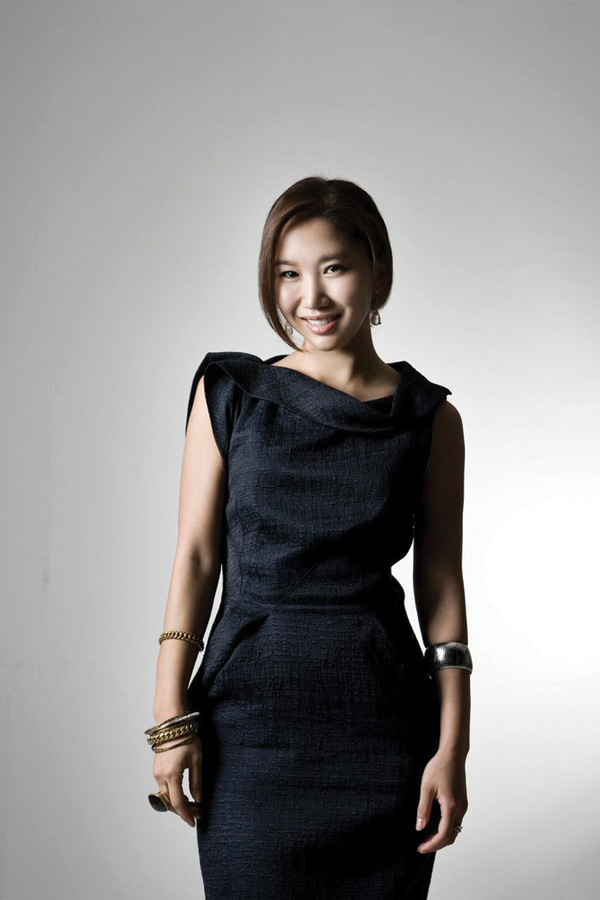by NAMJU CHO
During a tour in early January of the KwangJuYo ceramics factory in Icheon, a city about an hour’s drive southeast of Seoul known for its pottery and rice, artisans and apprentices were hard at work carving intricate floral patterns into clay-colored bowls and plates.
When Lucia Cho, the creative director of KwangJuYo, entered the design team’s workroom, the staff rose from their seats and didn’t sit back down until she walked out. In the elevator, she gave the tour leader a courteous bow as she wished him a happy new year. By the time we reached the ceramics store attached to the factory, she was joking around with the retail staff.
As the future successor to one of Korea’s most distinguished pottery purveyors, the 33-year-old Cho can be at once charming and seemingly intimidating as the granddaughter of the company’s founder. She has also turned into a cultural ambassador of sorts for a brand that sells premium soju Hwayo and operates two haute cuisine restaurants in Seoul, Bicena and Gaon.
 At left: An artisan carves a leaf into a vase. Right: A worker at the factory dips melon-shaped bowl for glazing.
At left: An artisan carves a leaf into a vase. Right: A worker at the factory dips melon-shaped bowl for glazing.
“Ever since I was young, I came to the [ceramics factory] a lot. Drawing came very natural [to me],” says Cho, as we later sit in a chauffeured car that zips from Icheon to Bicena in Seoul’s trendy Itaewon district.
As the middle daughter of three who grew up abroad, Cho speaks three languages and briefly worked for renowned chef Thomas Keller. She has helped usher in a global and modern sensibility to a company founded to preserve Korea’s centuries-old pottery tradition.
Her father is Cho Tae-kwon, the current head of KwangJuYo, who is expected to hand the reins of the company over to his daughter in the near future. For now, the younger Cho serves as creative director of KwangJuYo and Hwayo. She is also the president of Gaon Society, the company’s restaurant division.
“I’m most like my dad as far as personality. People told me I have the entrepreneurial blood,” she says.
A granddaughter of the late Cho So-soo, who founded KwangJuYo in 1963 as an artisanal ceramics company, Cho was born in Athens, Greece and raised in Korea, Japan, England, Italy and the United States. She is as comfortable speaking English and Korean as Japanese, and brings to her executive position a distinctly cosmopolitan bent.
After earning an M.B.A. from Loyola University in Chicago and a master’s degree in food culture and communications from the University of Gastronomic Sciences in Pollenzo, Italy, she wanted to work in a commercial kitchen, which led her to Thomas Keller’s Per Se restaurant in New York.
It was Corey Lee, Cho’s friend and the Korean American chef of Michelin-starred restaurant Benu in San Francisco, who first introduced her to his former boss at Yountville, Calif.’s
The French Laundry, considered one of the world’s finest restaurants.
“She basically just called me up, prodded me with questions, asking me to do this and that,” Lee recalls in an email interview. “It was a window into how ambitious and outgoing she is—something that has become an asset in her work. There is a certain fearlessness in how she approaches her work and interacts with other people, but it’s always paired with warmth and generosity.”
In 2010, Cho completed a three-month externship at Per Se, where she worked 15-hour days that provided only five-minute breaks to stand, eat or use the bathroom. “For the first two weeks, my body was in shock, but it got better afterwards,” Cho recalls.
Into her third month, Cho was offered a job as commis chef—the kitchen member who prepares all the basics such as stocks, juices and sauces. But she couldn’t stay on: her work visa expired, forcing the then-30-year-old to return to Seoul.
The senior Cho promptly gave his daughter a greater role at KwangJuYo, naming her creative director and paving the way for her to replace him one day.
Cho says it was tough adjusting to Korean culture once she returned to Seoul after 16 years of living abroad. She channeled her frustration into conceiving and opening Bicena. “I saw Korean food and it was so caged, with so many people claiming to be pros and with opinions on how to take it to the next level,” she says, calling the restaurant “my first baby.”
Despite the roots of her family’s company, Cho will be the first to admit she’s not an expert in everything dealing with Korean history. “Just because our business is about Korean culture doesn’t make me a Korean culture master,” she says. “I’m creating a restaurant. I’m creating a market.”
 Clockwise from left: KwangJuYo’s restaurant division includes such dishes as japchae with persimmons, jujubes and parsley; ojingeo soondae, or mixed squid, black rice, shiitake mushrooms and carrot rolled in kelp; and steamed dumplings filled with short ribs and mushrooms.
Clockwise from left: KwangJuYo’s restaurant division includes such dishes as japchae with persimmons, jujubes and parsley; ojingeo soondae, or mixed squid, black rice, shiitake mushrooms and carrot rolled in kelp; and steamed dumplings filled with short ribs and mushrooms.
Over the years, KwangJuYo has helped make Korean ceramic pottery, historically used only by Korean royalty and aristocracy, more functional, modern and part of Koreans’ everyday lives. While the elegant dishware still graces the banquet tables of Korea’s presidential residence, it is also sold to the wider public in a few retail stores and has entered the global market—exclusive collections are featured on the tabletops of Benu and The French Laundry, for instance.
In 2004, the company entered the spirits business, releasing its first highend soju, Hwayo, a year later. As with its meticulous, handcrafted approach with its pottery, the company uses a traditional method of making the rice-based spirit to elevate soju as a premium drink made from the finest quality rice. At its soju factory in Yeoju, Korea, oversized ceramic pots and oak barrels age the liquor, which is sold in select L.A. markets and, soon, in New York.
KwangJuYo established its restaurant division to promote Korean cuisine as a high-end dining alternative for Korean and foreign diners alike. The first of its restaurants, Gaon, opened in 2003. Although the modern Korean restaurant closed in 2009, unable to weather the effects of the global recession, Gaon recently reopened in December. It features a $150 tasting menu that offers 19 items such as an elaborate gelatin-like dish made from ginseng and other medicinal roots that takes three days to prepare.
Bicena (pronounced bi-che-na) is KwangJuYo’s second foray into high-end Korean food. Its name derives from the first syllables of the words biwoom, chaewoom and nanoom, which mean “emptying,” “filling” and “sharing,” respectively.
Opened in 2012, the restaurant serves dishes such as braised mackerel and radish in a spicy and sweet sauce and pork ribs stewed with extra-aged kimchi known as mugeunji. Dessert includes mulberry tea ice cream topped with candied pecan and yuzu sorbet.
Cho’s influence can be felt at these restaurants. After all, she brought in her knowledge and passion for Korean cuisine along with the rules and systems she learned and observed during her time at Per Se. She insists on keeping the menus seasonal. She also oversees everything from the chefs who are hired to the interior décor at the restaurants.
 Clockwise from top left: KwangJuYo’s Modern line; Classic line; and ivory-colored Cotton Collection.
Clockwise from top left: KwangJuYo’s Modern line; Classic line; and ivory-colored Cotton Collection.
“I have a hand in the menu for both restaurants,” she says. The one-time chef’s apprentice still remembers the motto at Per Se: “A sense of urgency and practice make perfection.”
Serving as food ambassador for KwangJuYo is where Cho shines, according to friends. “I think she is helping [to] bridge Western and Eastern ideas about food, restaurants and their roles in modern society,” Lee says. “Her time spent abroad and her education in both America and Europe has exposed her to Western ideas about dining and cooking—ideas that are clearly considered in her restaurants and in [the company’s] ceramics as well.”
The food world is taking note. Cho has served as a judge on a popular Korean food show, Hanshikdaecheop (or “Korean Food War”), where regional chefs compete against each other for the title of best chef in Korea. She has also appeared on Hairy Bikers, a BBC show where burly bikers are directed by locals on where to eat, and as a guest on London-based Korean American Chef Judy Joo’s show, Korean Food Made Simple.
As for her role at KwangJuYo, Cho is mindful that it’s “not just a project, but a family business.
“It was difficult to accept that [Korean culture] is my destiny,” she says. “[My involvement] started from obligation but it challenges me. Every month that I struggle, every step that I clear, I create a better environment for myself and my staff, and that’s rewarding to me.”
___
All photos courtesy of KwangJuYo
This story was published in the February/March 2015 issue of KoreAm. Subscribe today! To purchase a single issue copy of the February/March issue, click the “Buy Now” button below. (U.S. customers only. Expect delivery in 5-7 business days).
![]()







